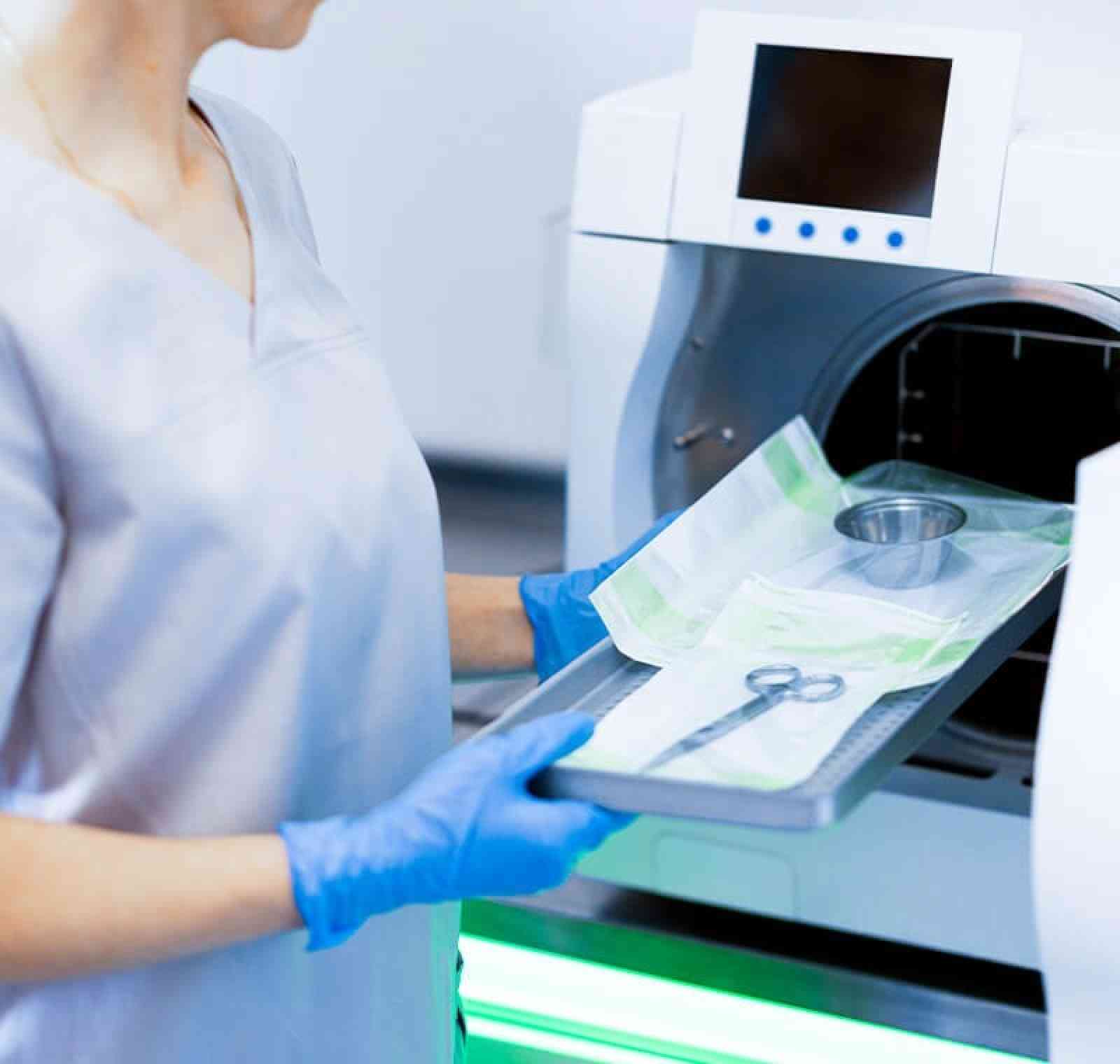SP 3000
Sterile Processing Technician
Train to become a Sterile Processing Technician to work in hospitals, surgery centers, clinics and other healthcare facilities.
Program Overview
Certifications earned
What Does a Sterile Processing Technician Do?
A typical hospital uses (and reuses) tens of thousands of medical instruments every month. Although some supplies are disposable, many are not. The reusable supplies come with their own special instructions for proper cleaning and maintenance. Sterile Processing Technicians (SPTs) prepare surgical instruments and devices. They clean, inspect, test, sterilize, store and deliver devices needed for surgery in a healthcare facility. Other job duties may include, verifying and accurately documenting missing instruments, recording sterilizer test results, ensuring each instrument is in good working order prior to placing in-tray for use, operating and maintaining steam autoclaves, keeping records of loads complete, items in loads, and maintenance procedures performed, make recommendations to management for possible improvement, and effectively communicate with operating room personnel and others.
- Identify central service workflows processes from cleaning, decontamination, preparation and packaging to sterilization and storage of surgical instruments and equipment
- Describe the importance of manufacturer’s instructions for use (IFU), infection control and use of personal protective equipment (PPE) throughout central service areas and their impact on personnel and patient safety
- Differentiate methods for quality control and assurance and the necessity of central service process documentation
- Discuss compliance standards and the role of HIPAA, OSHA, CDC, FDA, ANSI, AAMI and other regulating agencies
What You’ll Learn – SP 3000 Sterile Processing Technician
The MedCerts online Sterile Processing program prepares students to gain industry certification and ultimately to work in hospitals, surgery centers, clinics and other healthcare facilities.
This program includes three courses – Intro to Human Anatomy and Medical Terminology, Professionalism in Allied Health, and Sterile Processing – to prepare students to become well-rounded Sterile Processing Technicians. Because graduates will be working in a healthcare facility, it is imperative that they be able to speak and understand the language of medicine and have a fundamental understanding of basic human anatomy and physiology. Additionally, any role in healthcare requires the ability to work with a variety of personalities, including patients, doctors and medical staff. Our Professionalism in Allied Health program prepares you to handle any of these interactions. Because sterile processing tasks, by nature, typically involve hands-on interaction, it’s important for MedCerts to place increased focus on immersion and a high level of interactivity. Our students will feel as though they are part of the process, and that their physical actions are playing a vital role in their learning.
Upon completion of this program, the student will be eligible to sit for the provisional certification exam for Certified Registered Central Service Technician (CRCST) sponsored by the Healthcare Sterile Processing Association (HSPA, formerly IAHCSMM). Full certification is obtained after acquiring 400 hours of hands-on sterile processing experience within six months of provisional certification.
View More
Not Sure if Sterile Processing Technician Training is Right For You?
Take our easy 2 minute Career Quiz!
Find your next careerSome MedCerts programs are restricted in certain states or regions. Please review our State Restriction page to see what restrictions there may be in your state/region or residence of employment to ensure you are eligible for enrollment.
These restrictions may not apply to students taking programs through an employer, academic or government-sponsored model – including MyCAA, GI Bill® Reimbursement and Army, Air Force or Coast Guard Credentialing Assistance. To determine eligibility, please confirm with your sponsor or review our military spouse MyCAA-approved or Military Credentialing Assistance-approved programs
Program Details
- High School Diploma or GED
- Web browser with internet connection
- Course registration & payment
- English language proficiency
- Expert-led video based training
- Textbook: Central Service Technician Manual
- Competency assessments
- National Certification exam fee
*The cost of all materials needed for this program are covered by MedCerts. They are not included in the tuition costs and are provided at no additional cost to students. However, students have access to these materials for a limited time frame aligned with their program. Access to these materials outside of this period is not guaranteed, and students may be responsible for costs associated with any extended access.
- Dedicated Student Success Advisors
- Tailored support based on performance & behavior
- Exam preparation process
- 1 yr. post-program access to Career Center & Career Coaches
- Must complete 400 hours of hands-on experience in a CS (Central Services) department within 6 months/180 days.
Career Outlook

Sterile Processing Technician
Job Opportunities
openings in the US
potential
Tuition Cost
Sterile Processing Technician Training Online
Monthly, weekly and bi-weekly payment plan options are available. These payment plans include a 3.5% fee per transaction. Students who choose to pay in full will not be charged the transaction fee.
Active Duty Military Grants
MedCerts accepts education benefits from the Department of Defense for Active Duty Army, Coast Guard and Air Force and the Department of Veteran’s Affairs for GI Bill® Reimbursement.
Military Spouse Grants
Spouses of Active Duty Service Members in certain ranks may be eligible for assistance up to $2,000 per fiscal year or reimbursement for training.
Workforce Grants
MedCerts partners with American Job Centers in 30+ states and accepts Workforce Innovation and Opportunity Act (WIOA) and other workforce grant funding.
Veteran Grants
Veterans, active-duty service members and eligible dependents can enroll in select MedCerts training programs and receive reimbursement through the GI Bill® upon successful completion.
FAQs
Disclaimers
- Students residing in the states of New York, New Jersey, Connecticut, and Tennessee – these states require that Central Service Technicians become certified within a state-mandated period of time after employment (range from 1.5 – 3 years). This is NOT a barrier to enrollment for students but should be reviewed with an Education Consultant at the time of enrollment.
- While MedCerts training and related target certifications may be accepted and/or approved by your state of residency, employers reserve the right to dictate prerequisite education, experience, or certification/licensure requirements for their positions. We strongly advise students to research target job posts from area employers and relevant state requirements, barriers, or restrictions prior to enrollment to ensure eligibility upon graduation.

